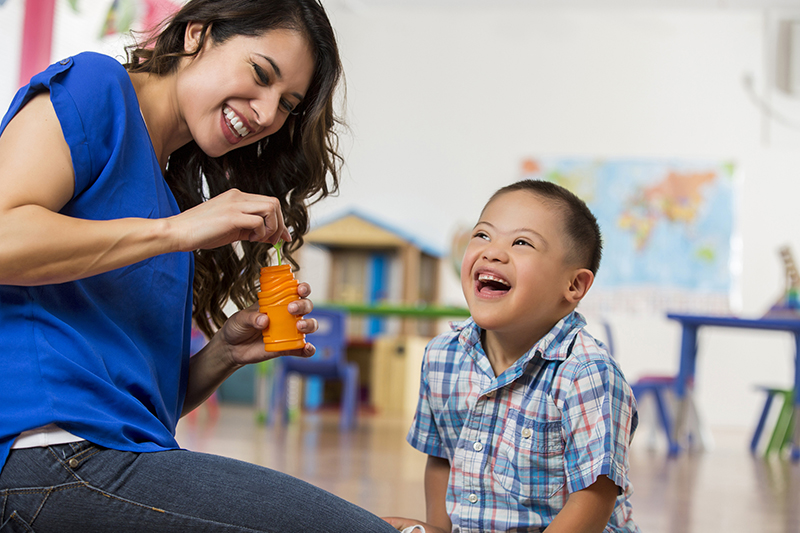Families For Life | Routines and Children with Disability

Routines can help family life run more smoothly. They can also be a way to help your child with disability develop skills. The best routines are the ones that suit you, your child and your situation.
About routines
Routines are how families organise themselves to get things done, spend time together and have fun. Every family has its own unique routines. Routines help family members know who should do what, when, in what order and how often.
Some routines might be for things you do every day – for example, getting ready for bed. These routines might involve things like having a bath, putting on pajamas, brushing teeth, going to the toilet, reading a story and going to sleep. You do these in the same order each night.
Other routines can be weekly or occasional ones. Examples might be going to the park a few times a week, going to playgroup on Tuesdays or doing the shopping on Wednesdays.
There’s no rule about how many or what kind of routines you should have. What works well for one family might be too strict and structured for another.
Why routines are good for children with disability
An organised and predictable home environment helps all children feel safe and secure, especially when things are stressful or when children are going through difficult stages or experiences.
If your child needs to take medicine or do other medical procedures regularly, a routine for this will make it easier for both of you to remember.
Family routines can also be a way for your child with disability to develop new skills. For example, if your child has a goal to work on communication skills and taking turns, you could remind him a few times during dinner that it’s his turn to talk about what happened at kindergarten.
If your child has complex needs, you might need to carry out most of her routine care. But your child will still enjoy and benefit from being part of your daily routines.
Routines can be good for you too. They can free up time for you to think about other things and help you feel more organised. You can also use them to introduce fun family activities like games nights or reading books together. Activities like these are good for relaxed family bonding and togetherness.
'Because our daughter’s needs were high, it almost seemed like the family routines we had went out the window. Getting a diagnosis and referrals to services and professionals was a tremendous relief, but then we were so busy that we still lived pretty much in chaos. It’s so much better now that we have a routine that we usually stick to. Even if we can’t all the time, I feel much better knowing it’s there and we can eventually get back to it.'
– Parent of child with disability
Getting the most out of your routines
Just like typically developing children, some children with disability like and need routine more than others. So the best routines will be the ones that suit you and your child, and that make your daily family life easier.
Effective routines also generally share three key features. These routines are:
well planned – good routines are clear, and everyone in the family understands their role and knows what they need to do
regular – good routines become part of everyday family life
predictable – in a good routine, things happen in the same order each time.
Once you’ve got some routines happening, getting together as a family to talk about how your routines are going can keep everything running smoothly.
For example, if your morning routine isn’t going well, you could ask, ‘What’s going wrong? How do you think we can fix it?’ Even young children will enjoy brainstorming ideas. It’s also a good way for them to practise problem-solving skills. You could also talk about how each person feels when your routines run smoothly and when they don’t.
Changing routines
What works well for a child or a family at one point in time might not be the best at other times. Circumstances change and unexpected things come up, so you might need to be flexible – for example, if your child isn’t well or hasn’t slept well, or you go on holiday. You might find after a break that you need to bring your routines back in gradually.
A break from routine can be good too – children with disability can enjoy spontaneity and fun just as all children do.
Talking about routines with other people
You could ask your child’s early intervention professionals about their tips for creating successful routines. They might be able to help you build learning opportunities into your routines.
Other people who care for your child will probably appreciate knowing about your routines – for example, friends, family or the staff at your child’s early childhood centre.
Helping your child follow routines
You can help your child with disability take part in family routines.
It can be as simple as using touch and voice cues – for example, touching your child on the upper arm and using his name to remind him to finish eating.
Social Stories™ can help. They’re simple books made with photos and simple phrases. For example, you could have a story for brushing teeth, which covers when to brush teeth and the steps to follow, such as picking up the toothpaste, undoing the cap, putting the toothpaste on the brush and so on.
Visual schedules can also help. For example, one for the morning routine might include pictures of getting out of bed, brushing teeth, getting dressed and eating breakfast.
© raisingchildren.net.au, translated and adapted with permission
Explore more